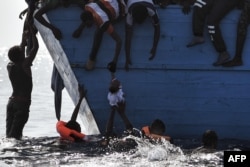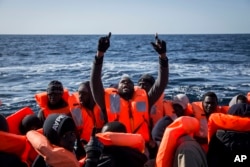The European Union hopes to stop the flow of migrants on the central Mediterranean route by spending more than $214 million to train the Libyan coast guard and fight people smugglers.
The European Commission Wednesday outlined the new plan, to be presented in Malta, where heads of state will gather next week.
More than 181,000 refugees and migrants crossed the central Mediterranean in 2016, the majority departing from Libya and arriving in Italy. More than 4,500 lost their lives when trying to cross the sea.
Federica Mogherini, the EU's high representative on foreign affairs and security, said the new efforts are needed to reduce the migrant flows and to stop the loss of life. Training the Libyan coast guard is key, she said.
“The losses of lives we see are more and more in territorial waters of Libya. And so it is a Libyan responsibility to prevent these losses of lives and to dismantle the trafficker’s networks, on the Libyan coast and in the Libyan waters,” Mogherini said.
Focus on Libya
The plan also focuses on strengthening the Libyan borders with neighboring countries such as Chad and Niger, and supporting the United Nations refugee agency and the International Organization for Migration.
Aspasia Papadopoulou, with the European Council of Refugees and Exiles, says the EU plan is pushing the migrant crisis onto a country that doesn’t guarantee the fundamental rights of migrants and refugees:
“More and more migrants and refugees will be stranded in Libya. And more and more will be sent back to transit and origin countries. More people will be detained and accessing Europe will become more and more difficult for those that need protection.”
The EU regards the Government of National Accord as the legitimate Libyan authority. Libya has been unstable since the fall of Moammar Gadhafi’s government in 2011 and different factions are in control of different parts of the country. Poor border control makes it easy for human traffickers and migrants to cross into Libya and smuggling has become a source of income to many.
Doubts over plan
Marco Funk is an analyst at the European Policy Center. He doubts the EU plan will work.
“It is hard to see how EU support for a weak and unpopular central government could improve conditions for migrants. It could even make things worse, as counter-smuggling activities could effectively amount to an EU-financed crackdown against the ethnic groups running them, thus undermining political stability," Funk said.
"However, EU engagement could still be effective if it focuses on stabilizing Libya’s political situation by helping the Libyan authorities build trust between ethnic groups,” he added.
The EU said the plan could only work if economic development and peace and stability are improved in Africa; but, the EU also stated that it is not trying to replicate its Turkey deal with Libya. Ten months ago, the EU and Turkey agreed to a plan that provides Turkey with billions of dollars in exchange for preventing migrants and refugees from entering EU territory.
The EU is also trying to implement pacts with five African countries. Ethiopia, Niger, Nigeria, Senegal and Mali would be offered aid intended to boost economic development, create jobs and provide other aid to reduce migrant flows.
The Malta gathering on February 3 will need to convince European heads of state to invest more money to match the more than $214 million, which will be made available from the EU Emergency Trust Fund for Africa.






